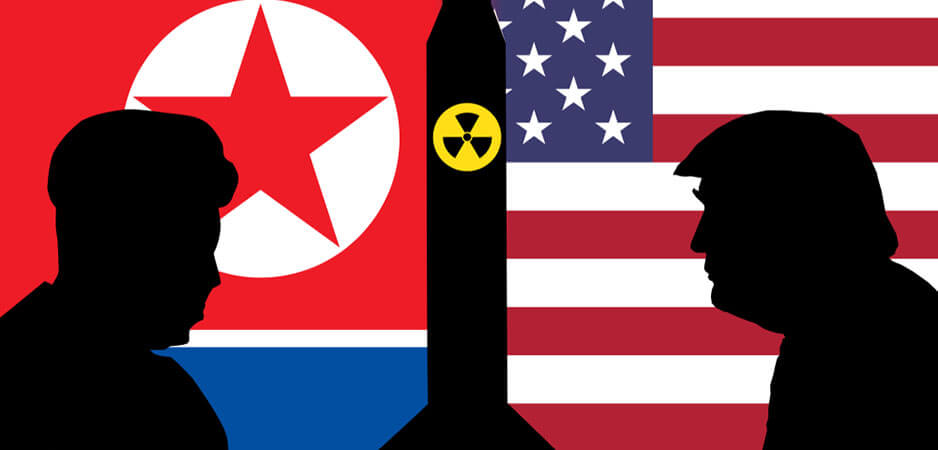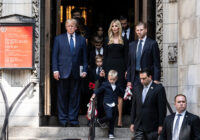Can the world expect substantive achievements to come out of the meeting between Donald Trump and Kim Jong-un, two of the most unpredictable leaders?
The world can be forgiven for having been whipsawed by Washington’s announcement on March 8 that President Donald Trump will meet with North Korean leader Kim Jong-un. The revelation came after briefings at the White House for the US administration by South Korean officials following South Korean President Moon Jae-in’s dispatch of a delegation to Pyongyang for talks with their North Korean counterparts. Those meetings resulted in the invitation from Chairman Kim for the meeting between President Trump and him.
No sitting US president has ever met with a North Korean leader. (Presidents Jimmy Carter and Bill Clinton did but only after leaving office.) The jolting realization that this may now take place — tentatively scheduled for May — with a sitting US president who has variously threatened, taunted and excoriated Kim has the foreign policy intelligentsia and US public both flummoxed and leery, and probably just a bit anxious.
Is Donald Trump — both famous and infamous for his much touted deal-making skills, but also notorious for ignorance of complex foreign policy issues and lack of interest in educating himself — really up to this? Let’s remember, we are talking about two leaders who have both bragged about their nuclear weapons and threatened to use them.
Credit goes to South Korea’s President Moon for recognizing and capitalizing on the Pyeongchang Winter Olympic games to encourage North-South dialog. Especially noteworthy is his recognition that any such proposed talks between Trump and Kim would be dead on arrival in Washington without the North’s agreement to discuss the “d” word: denuclearization of the Korean Peninsula.
Hoping the Past Isn’t Prelude
Let’s return to reality. In the past, negotiations have been a tried and true tactic of the North Koreans to extract what they need from the US and the West, only to restart nuclear and missile testing when they got what they wanted. Invariably, their nuclear strategy proceeded almost unabated.
The US and its various negotiating partners, including South Korea, China and Japan, have all had the carpet pulled out from under them every time they’ve attempted to negotiate with Pyongyang, including the most recent and short lived in early 2012. North Korea had pledged not to launch satellites in exchange for US and other Western aid. The agreement was abrogated when the North launched a satellite a few short months later to celebrate the centennial birthdate of the country’s founder, Kim Il-Sung. And so it has gone, dating back at least to 1993. Ditto on agreements with South Korea, the UN and the International Atomic Energy Agency. Can we expect this time to be any different?
The North is negotiating from a much different vantage point this time. It has nuclear weapons. It also possesses the means to deliver them, most certainly to South Korea and Japan and possibly even the US West Coast. The dynamics are changed, and not to the advantage of the US or its South Korean ally. Moreover, the North’s young and ruthless leader — he ordered the assassination of his half-brother and execution of family members perceived as disloyal or threatening — has threatened to use them, including against the US. Possessing these weapons with the means to deliver them empowers Kim as never before, giving him leverage his grandfather and father could only have dreamed of. What does he want?
What Kim Jong-un Wants
The consensus appears to be that Kim wants the US out of the Korean Peninsula — i.e., to sever what has been one of Washington’s most important alliances with South Korea. Undoubtedly, there are other interests — official recognition, economic ties with the US and other major economic powers — besides China, which have taken a hit as of late due to increased sanctions, and the opportunity to appear one-on-one on the world stage with the leader of the world’s superpower. There he’ll be able to say to the American president, “I’ve got what you’ve got, now let’s talk!”
 This is not a position that a US president has faced since the arms negotiations of the 1970s with the Soviet Union, which roughly qualified as an “equal.” Nuclear weapons have handed the leader of an impoverished, isolated police state the dream of every dictator: gravitas, respectability and the attention of the U.S. and its president.
This is not a position that a US president has faced since the arms negotiations of the 1970s with the Soviet Union, which roughly qualified as an “equal.” Nuclear weapons have handed the leader of an impoverished, isolated police state the dream of every dictator: gravitas, respectability and the attention of the U.S. and its president.
Heretofore, Kim has made clear he will not give up his new-found leverage… ever. This may be mere posturing, but one must still ask: Is he really willing to rid his nation of its nuclear weapons, missiles and supporting infrastructure? And the answer is, only if he gets what he wants… maybe.
Meeting of Unknown Minds
Further obfuscating an accurate reading of this announced gathering is the personalities of the two principals. In past summits between an American president and his counterpart from any nation, senior State Department and National Security Council officials and experts conducted extensive pre-meeting negotiations so that the main event would be almost a mere formality — i.e., the handshakes, signings, banquets, toasts and photo ops. Pre-meetings are intended to sort out major issues, identify obstacles, reach preliminary understandings and ensure the ultimate encounter between principals is a satisfactory one. But that hasn’t happened this time, presumably at all.
Instead, these talks will be in the hands of two erratic and unpredictable leaders who are not likely to fully and accurately understand the other or the issues and implications. Nor will the issues have been tackled in advance by senior experts. That’s a risk.
For his part, Donald Trump places far too much stock in his innate abilities, soi-disant high-functioning gut instincts and business acumen, qualities that have earned him the Oval Office and the unflagging support of a core following within the Republican Party. He places little trust in the expertise and counsel of experts around him. That’s a further complicating risk. Luckily for Americans and South Koreans, the more sober-minded South Korean President Moon won’t be far away, one presumes, and should help keep the American tethered. Or at least, Americans and South Koreans can hope.
Kim, on the other hand, will face an American president he knows only from media reports and biased and censored information from his eager-to-please intelligence service, loath to tell him anything he may not wish to hear, less they suffer the fate of other disloyal minions. It’s impossible to know his mindset in the run-up to this meeting.
All this suggests that despite whatever happy talk emerges from this summit of shock, concrete results may be lacking and, in any event, suspect. It will depend on one ineluctable fact: What is on the mind of Kim Jong-un? For that, the world must place its trust and hopes in an untested, inexperienced president, whose own mind remains a mystery.
The views expressed in this article are the author’s own and do not necessarily reflect Fair Observer’s editorial policy.
Photo Credit: Abraham Magnawa / Shutterstock.com
Support Fair Observer
We rely on your support for our independence, diversity and quality.
For more than 10 years, Fair Observer has been free, fair and independent. No billionaire owns us, no advertisers control us. We are a reader-supported nonprofit. Unlike many other publications, we keep our content free for readers regardless of where they live or whether they can afford to pay. We have no paywalls and no ads.
In the post-truth era of fake news, echo chambers and filter bubbles, we publish a plurality of perspectives from around the world. Anyone can publish with us, but everyone goes through a rigorous editorial process. So, you get fact-checked, well-reasoned content instead of noise.
We publish 2,500+ voices from 90+ countries. We also conduct education and training programs
on subjects ranging from digital media and journalism to writing and critical thinking. This
doesn’t come cheap. Servers, editors, trainers and web developers cost
money.
Please consider supporting us on a regular basis as a recurring donor or a
sustaining member.
Will you support FO’s journalism?
We rely on your support for our independence, diversity and quality.






